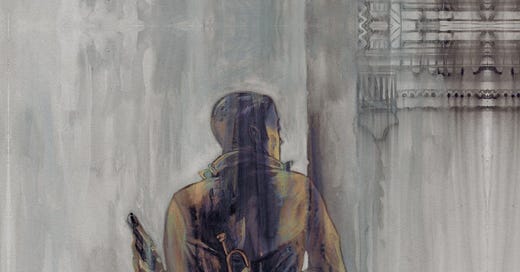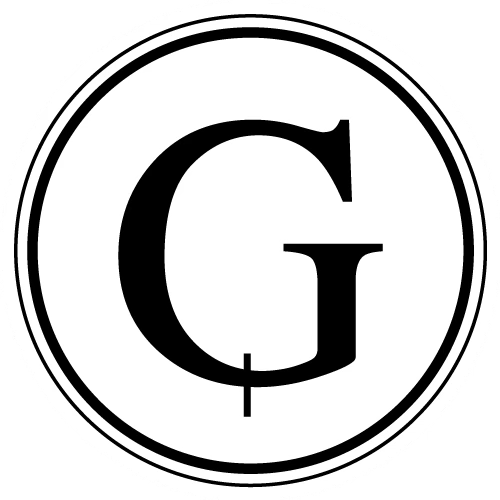What follows is Part 38 of Becoming P.T. Lyfantod
If you missed Part 1, start there:
Chapter Eleven:
To Be a Bard
“…your reward.”
Something shifted into place. A short melody echoed through the chamber. The light cooled and dimmed. And as Lightfoot stepped aside, the painting on the wall behind him took on new dimension. The beams of sunlight faded. The sky darkened, and the clouds parted to reveal a patch of starry sky, a gibbous moon peeking out behind. New moonlight glinted off the armor of the heroes, the turbulent sea looked deep enough to drown in, and five gently waving lines like silver thread came streaming from the mouth of the painted Lightfoot’s horn, swirling out across the night. It was mesmerizing.
“I want to congratulate you all on completing the First Trial. It is no mean feat! As a matter of fact,” he tilted his head, “it’s been some time since we had any new recruits…”
“Couldn’t possibly have anything to do with your putting the first stone in the middle of a sodding forest,” Godwyn muttered.
Lightfoot was unfazed. “I foresee bright, lyrical futures for each and every one of you.” He glanced in Tom’s direction and winked. I thought I might actually throw up.
In the silvery light, Lightfoot seemed somehow ghostlier than before. “The first spell I’m going to teach you—or spellsong, as they’re sometimes called—is called Lightfoot’s Disarming Lilt.” His lips quirked. “You may have noticed the name sounds a tad familiar. That—” he held up a finger, “—is because the talent for writing spellsongs is a surpassingly rare one. The ability seldom appears more than once in a generation. As such, when a spellsong is named, it almost always includes a nod to the bard who wrote it.”
Stuart raised his hand before he spoke. “Did you write many spellsongs when you were ah—alive?”
“A fair few. All of the songs you learn during these trials will be my own compositions, but you will eventually come to know the work of others was well: Mistral and Thigma and Marr. Veles, and Bentrovati, to name a few.”
I wished I had a pen. What if those names were in the Book? Might I be able to find more spellsongs? Or more ghosts…? By the look on Merry’s face, I guessed she was having similar thoughts. Mistral, Th…
Hold on! I did have a pen! But no paper. To hell with it, my arm would do. Mistral, Thigmar, and… Oh bugger—
“This first song is a simple one. In fact it’s so short you cannot really properly call it a song at all. The length and complexity of spellsongs vary greatly, from explosive shouts to rousing jigs and languishing laments. Some will work only for as long as you sing them. Others are immediate and lasting. They may be lyrical, or not—”
“What about instruments?” asked Iain.
“Certainly. Instruments have their place. Some spells will work only on instruments—or on one instrument but not another. Drums,” he added, “are particularly useful in songs used to excite the spirit… or arouse fear.” Godwyn chuckled knowingly. “Even without the bardic touch, the war drum is a weapon, make no mistake.”
Iain nodded excitedly.
“Are there any pure instrumentalists?” I asked. “Bards who don’t sing… but play instruments?” Are there any bards who are absolute rubbish at singing?
“Instrumentalists?” By the look on Lightfoot’s face, he’d never considered the possibility till that very moment. “I—I suppose there might have been,” he said slowly. “But I’ve no knowledge of them. You see—bardistry is not just about music. It is storytelling. Persuasion. Bards are record keepers and historians as much as entertainers. We inspire heroism with tales of heroes past. Instruments have their place, but without the voice—I can’t imagine…”
I nodded silently and wished I hadn’t asked.
Lightfoot cleared his throat and continued. “Your voice is your most versatile tool. Even stripped down to your underthings, you’ll never be without it. It’s the weapon no one ever sees coming, and it can’t be taken away, barring rather… extreme measures. And since everyone has one, everyone assumes they know how to use it. They’re wrong.”
Merry nodded along as if all this was obvious. I exchanged uneasy looks with Iain and Stuart. I will not be left behind. I’ll practice twice as hard. Three times…
“You have proven yourselves once, and I trust you’ll do it again. If you succeed in joining my Order, I will teach you to use your voices in ways you never imagined. It won’t be quick. It won’t be easy. But with enough time and the right tutelage, you all have the potential for greatness. And for those of you who don’t already sing,” he smiled at Stuart, Iain, and I, “an ear for music is a fine start.”
I tried to smile back.
“There are no hard and fast rules for bardistry, other than getting the words right. That much should go without saying. But certain things will generally affect the outcome of your attempts.” He ticked off fingers, his bare feet slapping against the floor as he pattered back and forth. “Pitch and rhythm. Get those wrong, and you’re left with noise. Intent. You’ve little chance of beguiling someone accidentally, or finding yourself ensorcelled by any cheeky pet starlings. However, some songs will do their work no matter what, so be mindful of where you sing, and whom around. Strength of will. Much of magic is an exertion of your will upon the world. And the world is wont to resist. When you cast the Disarming Lilt upon another, you pit your will against theirs. Done properly, they’ll never know it. But if their unconscious mind proves stronger, the song will fail. And lastly, that which can neither be learned, nor taught; that which separates the good from the truly great, where the true power of bardic magic really lies. The artist’s touch.”
“The what?” Tom frowned.
“I’m talking about virtuosity. Creativity. Style. Anyone can sing a song, if they know the words. But it takes talent to bring it to life. And that, you either have… or you don’t.”
“There's probably no telling if we have it,” I said, “till we've trained up a bit…”
Lightfoot wagged a finger. “Talent shines, Puw. Like a sun among the stars.”
“But you know,” said Stuart. “Technically, stars are just suns viewed at a distance.”
Lightfoot looked at him with an expression of alarm.
“What happens if a spellsong fails?” asked Merry.
“A… fine question, Meredith,” Lightfoot coughed, turning to her after one last disquieted glance in Stuart’s direction. “It depends on the song, and why it failed in the first place. Some merely fizzle, as the parlance goes.” He made a ‘poofing’ sort of gesture with his fingers. “Others backfire…” His eyes went faraway. “I saw a man pour coal dust over an open flame once. Lost his beard, his eyebrows, and his nose had a droop once it healed. If you don’t understand the forces you’re playing with, it’s best to not to play at all. And if the song is complex enough, you never know what could happen. Take Finghin O’Toole. A spellsinger of the highest rate, a bit before my time. Loved by all who knew him. A great booming baritone, faster with a fiddle than a Connemara pony. They found what was left of him—”
“What was left of him?”
“—at the bottom of a gully,” Lightfoot nodded. “Most of his left side, and as luck would have it, his head. It’s said he heard a song in a dream, and was compelled to sing it. Let that be a lesson to you.”
“But what happened to… the rest of him?” asked Stuart.
“Other than impressions left by a set of very large teeth, there wasn’t much to go on. Suffice it to say Finghin O’Toole attracted unwanted attention. You needn’t worry about that just yet. Unless you’re having any peculiar dreams…” He nodded with apparent relief as we shook our heads. “As far as the Lilt goes, if it fizzles, your subject will merely be unaffected. Except they’ll have heard you sing… which they’ll likely find odd. They may well believe you’ve lost your mind.” Lightfoot shrugged. “I’ve often found a fizzled attempt at the Lilt can be just as disarming as a successful one, if for different reasons. But that’s enough theory. Let’s show you how it’s done.”








If you decide to put this in print, I'll buy a copy. Maybe two, so I can give one to my nephew. This is right up his alley...